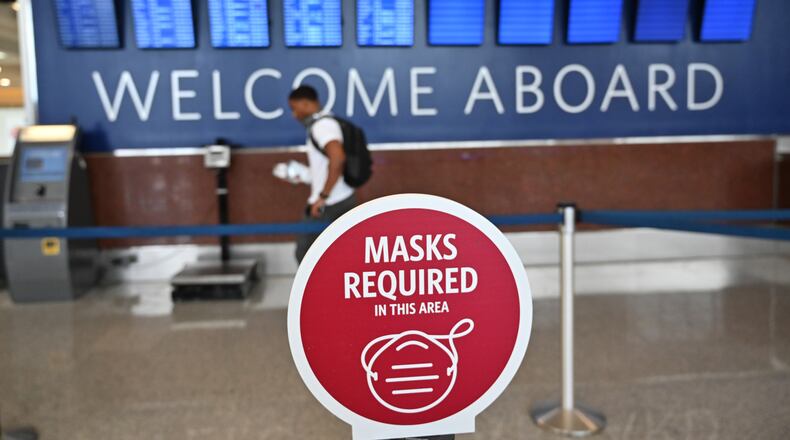As travel plummeted around the globe in 2020, an airport in China overtook Hartsfield-Jackson International to become the world’s busiest in passenger traffic.
For the first time in more than two decades, the Atlanta airport didn’t record the highest passenger count, according to preliminary world airport traffic rankings released Thursday. That title now belongs to Guangzhou Bai Yun International Airport.
However, Hartsfield-Jackson was the busiest airport as measured by flight count, taking that title back from Chicago O’Hare.
For passenger counts, seven of the 10 busiest airports in the world in the pandemic year of 2020 were in China, statistics from the Airports Council International show. China staged a recovery earlier than the rest of the world and, in a vast country with a population of nearly 1.4 billion, has a substantial domestic travel market to draw on. Meanwhile, international travel has remained largely shut down due to COVID-19.
Hartsfield-Jackson had a 61.2% decline in passenger traffic last year, while Guangzhou had a 40.4% decline. Guangzhou handled 43.8 million passengers in 2020, while Hartsfield-Jackson handled 42.9 million, down from 110.5 million in 2019.
Atlanta officials have long prized the “world’s busiest” title, which Hartsfield-Jackson has held since 1998 for passenger counts.
“While we have been proud of our title as busiest in the world, 2020 was an unprecedented year, with unprecedented challenges, impacting travel across the United States and the globe,” said Atlanta Mayor Keisha Lance Bottoms in a written statement. She said the airport took steps during the pandemic to protect passengers and employees. “Those steps are allowing Hartsfield-Jackson and its partner airlines to return to normal, with a renewed push to reclaim our title as the world’s busiest airport.”
But the passenger-count gap between Atlanta and the rest of the world has been closing for years. In 2019, Beijing Capital International Airport was in the No. 2 spot. However, it was an airport in South China — Guangzhou Bai Yun International — that jumped to No. 1 last year, up from the No. 11 spot in 2019.
Beijing has multiple airports that split up traffic, while Guangzhou Bai Yun is the primary one in its part of China.
Airports Council International said its rankings showed “the dramatic impact of COVID-19 on what are ordinarily the world’s busiest airports.” The airport group said the jump in rankings of Chinese airports illustrate “the uneven nature of the impact of, and recovery from, the pandemic across the world.”
While the coronavirus outbreak started in China in late 2019, government officials there imposed lockdowns. By mid-2020, the country was staging an economic recovery. That gave it a head start as the coronavirus was spreading across the rest of the world and driving disruptions that would continue into this year.
Last summer, major airlines in China offered “all you can fly” deals to help revive air travel, Reuters reported. Among them was China Southern Airlines, a state-owned carrier that has its hub in Guangzhou.
For years, Hartsfield-Jackson had been handling more than 100 million passengers annually. But, once the COVID-19 pandemic hit in March 2020, airlines grounded hundreds of planes and canceled thousands of flights.
For flight counts, Hartsfield-Jackson’s 548,016 bested Chicago O’Hare’s 538,211 last year. Atlanta had a 39.4% decline in flights while Chicago O’Hare had a 41.5% decline.
Hartsfield-Jackson in recent weeks has seen more travelers streaming through the airport, particularly during busy holiday periods. The airport’s economy lots reached capacity over Easter weekend, and security lines have been longer during peak periods.
On Thursday, Atlanta-based Delta decided to buy an additional 25 Airbus A321neo planes and added options to buy more, saying that will position the airline for growth.
World’s busiest airports, ranked by passenger counts in 2020:
1. Guangzhou, China, 43.8 million
2. Atlanta, 42.9 million
3. Chengdu, China, 40.7 million
4. Dallas/Fort Worth, 39.4 million
5. Shenzhen, China, 37.9 million
Source: Airports Council International
About the Author
The Latest
Featured





